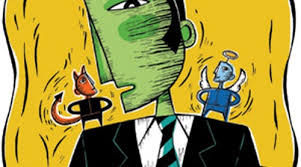Journal 4
- Linda Teo
- Mar 6, 2022
- 3 min read
Updated: Mar 6, 2022

In philosophy, ethical dilemmas, also known as ethics paradoxes or moral dilemmas, are situations in which an agent must balance competing moral imperatives, none of which takes precedence over the others. A situation in which every alternative option is wrong. An ethical dilemma occurs in a decision-making context when one or more of the available options requires the agent to violate or compromise their ethical standards.

3 impact and key takeaways from the 4th session of the lecture are:

1. Corporate Social Responsibility is Ethics. Simon Sinek says that it is not what you do after you make the money. It is what you do in making the money. It is so true. Looking at organisations like The Body Shop who preached no animal testing, doTERRA’s Co-Impact Sourcing strategy, Jurlique’s biodynamic farm producing unblemished botanicals to Bio-Intrinsic process of hand harvesting, maintaining pure sustainability from reducing carbon footprint, zero waste and using clean energy and looking after its people.

2. “Every problem we face today is the direct and inevitable result of yesterday’s brilliant solutions.” By Architect Henry Bergman. I first had this thought crossing my mind after the 1st session. I had co-related to my experiences and re-looking back at my younger days. As I shared that I grew up adapting and integrating technology into my daily life. Did technology grant me freedom or addiction? An example, with the help of technology, did I get more time to do things other than things that I could grow or develop myself further? OR have I fallen prey to another technological invention, mobile phones, the internet and other tech gadgets?

3. a. Unconscious bias
Unconscious biases, also known as implicit biases, are attitudes that individuals hold subconsciously and change their feelings and perceptions of others in their surroundings. After watching the video, with some reflection, I realised that I am no exception to this and it is usually emotions driven. I would have to take extra effort to take a couple of seconds to process my thoughts and be mindful of what I say, do and act to mitigate unconscious bias.

b. Trolley Problem – Would you sacrifice one to save five? – Eleanor Nelsen.
A trolley problem is an ethical thought experiment about a hypothetical scenario in which someone has the choice to either save 5 people at risk of being hit by a trolley or to kill only one person. This is the most difficult for me when I uphold ethics as one of the top 5 values in life. Neither decisions/actions are good nor morally right. However, I will have to learn to think about choosing when there are no good choices. Do I pick the action with the best outcome or stick to a moral code that prohibits causing someone’s death?

To share a personal experience that would illustrate the Trolley Problem would be the time when my boss sold his business to another person and the client had requested for me to be part of the deal. If the new boss/owner is not able to hire me back to manage the contract then the entire business deal will not go through. At that time, I was in my 9th year of employment and had left the company before it was sold and the business has 250 employees. It was a dilemma for me to cross over to the new company as I was all ready to start and explore a new journey. I would have to sacrifice my time and put off personal plans. However, with the thought that 250 employees might lose their jobs and it would be a ripple effect affecting their families and the business deal would fall apart, I decided to take the offer on the pretext that I will have a successor trained up to take over my role. It took me 4 years to do so and left the organisation subsequently.





Comments